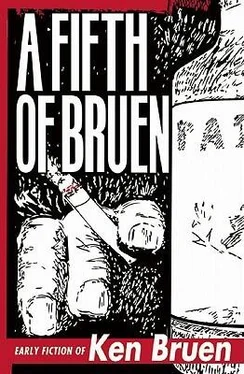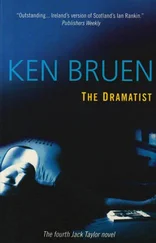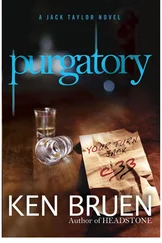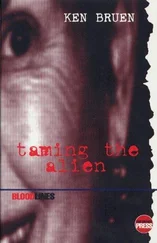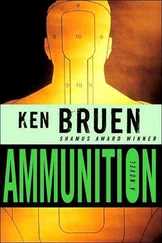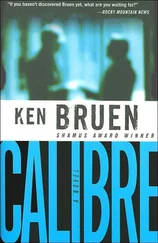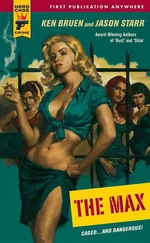She looked startled, then smiled.
“You’re Irish?”
Following this lady’s thought process was very unnerving. She continued, “I couldn’t understand a person coming here... for coffee.”
“Well, I didn’t think they’d give me Guinness.”
“I don’t think they’re fond of me as it is.” She laughed again. “I’m Grace,” she said.
Ford considered, then went for the brogue.
“And tis graced I am myself to meet thee.” Not bad. Not great, but he was new to this.
“Are you American?” he asked.
“Hey, very sharp. I though my Fortnum and Mason accent was foolproof. I’m from Wisconsin, and for a while there I had a limey husband.”
“Lousy?”
“Yeah, that too. No, Limey. Like English. Cecil. Cecil’s my husband,” she smiled deeply here. “Hey, I like saying that. Back home, you call a guy Cecil, you better reach for a weapon... and be carrying something a little more lethal than an attitude. But he’s a story that needs at least three bourbons for lubrication.” Ford considered. How dangerous could someone called Cecil be? Realistically, how much?
“What’s your name?” she asked. “I mean, if you’re buying me a drink, it helps. I’m not saying it’s essential, but I’m curious.”
“Ford.”
“That’s it, Ford? Blunt and macho. Well, no shit. Don’t fool with this dude. Ever read Ford Madox Ford?”
“ The Good Soldier ?”
“Way to go, course you Irish have some sort of lock on writers, am I right?”
Did this require an answer? Ford didn’t think so.
“Let me pay for this,” Ford suggested, and she agreed. After he paid he stood with a vague smile, looking at the bill.
“Something wrong, Ford?”
“No.” He was thinking this place has brought the “dip” to a professional level. They walked up Charing Cross Road past 84, and Grace said she’d sure like to have met Helen Hanff. Grace knew a small pub off New Oxford Street and they went there.
The barman said, “Hi, Grace,” and Ford thought, “Oh yea?”
“How do you feel about sour mash?” she asked.
“Is that like sour grapes, or bitter spuds?”
“Droll, Ford. Let’s drink Stateside liquor. They got ’em all here.”
“Hey, Tommy, you want to bring us some sour mash and make them big suckers. On the rocks.”
Tommy wanted to, and did. He was in his fifties with a lopsided leer. He showed his teeth a lot, which was a mystery. The teeth were not so much stained by tobacco as blitzed. Lashings of Old Spice didn’t disguise the fact that Tommy had sampled some sour mash himself, and not long ago. Judging by his smile, maybe he’d drank the Old Spice.
“You’re a doll,” Grace said.
The barman didn’t strike Ford as such unless The Brothers Grimm had designed some.
“You know why I like this place, Ford?”
“The ambience?”
“Good word, been reading Improve Your Word Power, in the Reader’s Digest , I’d say.”
She walloped back the drink so Ford did the same and nearly went through the wall.
“Arr... gh!” he cried.
“Old Kentucky Mule Kick,” she said. “Tommy, get your ass in gear. I like this place ’cos they got a juke box. Wanna play?”
“Any Waylon Jennings?” he asked, still dazed by from the bitterness of the sour mash. Sour, it was the pure bitterness of Lucifer.
She looked at Ford as more mule-kickers arrived. She said, “Lemme guess, it’s the wailing you like?”
“Well, Grace, I like the melancholy. Us Irish are happiest with a full blast of sadness. Music to hang yourself by basically.”
“You and Sylvia Plath, both, be my guest.”
Later, the bar began to fill, and Ford would have said something but his tongue felt shredded. The mule had indeed kicked. Grace began to stand up. Ford couldn’t bear the thought of her departure. She moved her face right next to his. “Here we go,” he thought, “the old peck on the cheek and sayonara.” His heart was broken.
“So, Ford,” she said, “you wanna get laid or what?”
“How was it for you,” Ford asked. He blew a nigh perfect smoke ring rising to the gods. If he felt any better they might have to certify him.
“Well... You’re a cryer, I’ll give you that.”
Ford felt gut kicked. Who needed sour mash? She added, “I liked it, don’t get me wrong, but it wasn’t special. You wouldn’t want me to lie... You’re not that kind of guy.”
I am, he roared silently, I am. Jeez! Lie to me and lie big . Who wanted honesty? He wanted to be a stud. Ford always felt that when someone said “I respect your honesty,” you should check the silverware. He could see his epitaph:
“A man of integrity but a lousy lay.”
Oh my God!
Grace turned to him and said, “So, you want to try again?” He did.
Ford knew the difference between a gift and mere talent. He had a talent for drawing. His sketches won him prizes at school. But gifted, no. You could develop a talent but you couldn’t work towards a gift. You were or you weren’t and he wasn’t. Vikki had given him a lavish copy of Beardsley’s work and he almost never looked at it. “Look and weep,” he knew. Somerset Maugham had said, “The greatest curse must be to have the compulsion to write, and no talent.” Ford shuddered on reading that. Substitute “sketch” for “write.”
Feeling a time of inspiration around them, Ford had a mental picture of Addie Bundren on the back of a wagon. He could see the red clay of the Mississippi... and sketched it... over and over till he felt he caught Faulkner’s vision... and obsession. It hung in his living room. With visitors to his flat, Ford appreciated the difference fully twixt talent and the jackpot. They’d say, “Nice sketch. Hey, I love your sofa, where’d you get it?” If he were gifted, they’d say, “Wow, what a sketch!” No mention of the bloody sofa.
Grace had looked at the sketch for what seemed like a long time. Ford, in anticipation actually fell on the sofa.
Finally she said, “Read any Faulkner?”
He loved her then. It was the best moment of all that they’d had. Ford was blessed just then because he knew the moment for what it was. Knew and understood and was grateful near to weeping.
Grace was in his life for three months. They drank sour mash, wailed with Waylon and made love a lot. Ford was never sure if he became a better lover. Certainly he became a more frequent one. Grace hadn’t told him the deal on her husband. She wasn’t a lady to urge “Tell me now.”
Grace wouldn’t live with him. That was O.K., he felt almost good enough to sketch again. Then that Friday she arranged to meet him at Finches on the Fulham Road. She arrived late and, uncharacteristically, bothered.
“Let’s drink gin,” she said.
Ford had already started on scotch, but hell, he was flexible.
She looked pale but it made her look lovelier to Ford.
“I hate this pub,” she said, “almost as much as I hate gin.”
“You aren’t pregnant... or anything,” Ford ventured. As to whether he disguised the hope in his voice, he’d never know for sure.
“No such bloody luck,” she said. “Cecil has returned to London. He’s been Stateside these past months... or do you think I invited him?”
“I dunno, Grace.”
“Judas Priest! That’s from Hill Street Blues... You couldn’t invent Cecil. He’s moving permanently to New York and... I’m the wife, so...”
“You’re going to New York”
“Bingo! God, this gin is awful.”
“Have something else.”
“What! And feel better? I wanna get drunk, not happy.”
“It’s over between us then,” said Ford. Stating the obvious was all he could muster.
Читать дальше
